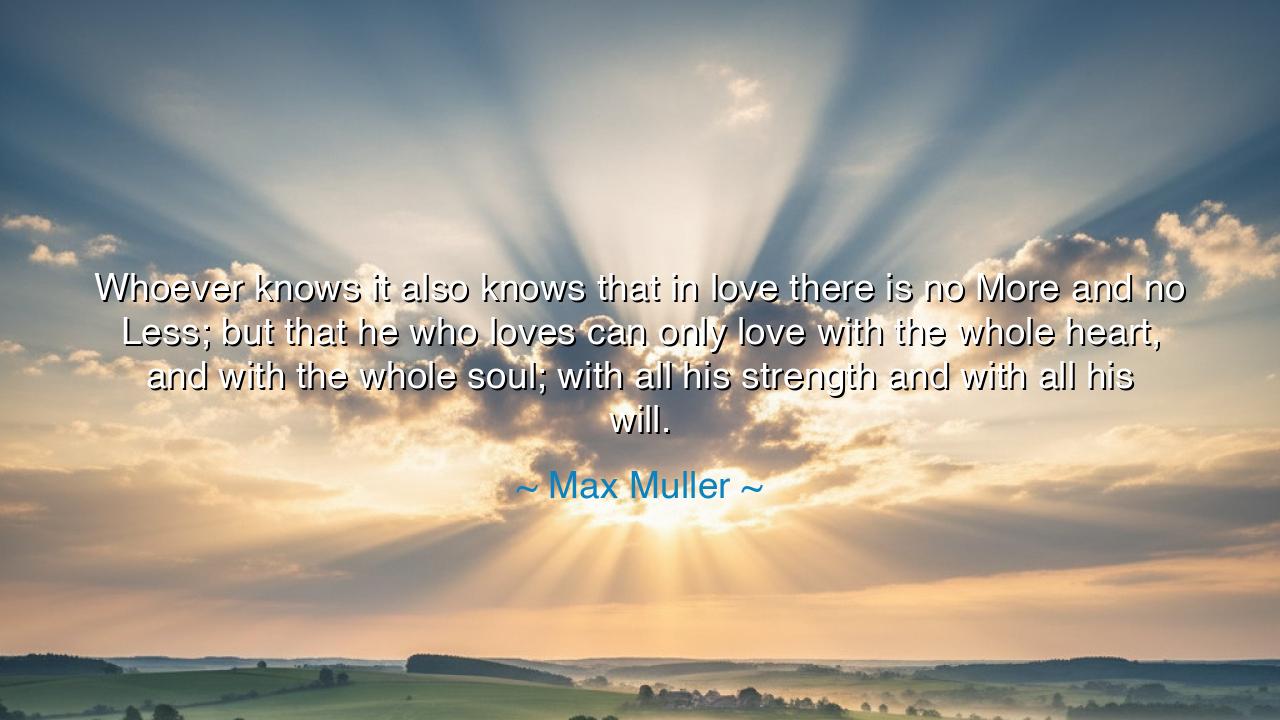
Whoever knows it also knows that in love there is no More and no
Whoever knows it also knows that in love there is no More and no Less; but that he who loves can only love with the whole heart, and with the whole soul; with all his strength and with all his will.






Hear the voice of Max Müller, the great interpreter of sacred texts, who spoke thus: “Whoever knows it also knows that in love there is no More and no Less; but that he who loves can only love with the whole heart, and with the whole soul; with all his strength and with all his will.” These are not casual words, but the distillation of ancient wisdom. For Müller, steeped in the scriptures of East and West, understood that love is not a portioned thing, to be measured out in halves and fractions, but a flame that consumes the whole being. To love at all is to love completely, without reserve, without remainder.
The origin of this saying lies in Müller’s lifelong study of religion, language, and the human spirit. He translated the Vedas, immersed himself in the Bible, and sought to weave the wisdom of many peoples into one understanding of truth. In the scriptures he found a recurring command: to love with the whole heart, the whole soul, and with all strength. He saw that across cultures and ages, love was not spoken of as convenience, but as devotion—an act that demands the entire self. Hence his declaration that love cannot be weighed in balances; there is no "more" or "less." There is only the total gift of the self.
This truth shines clearly in the story of Ruth, the Moabite widow of the Hebrew scriptures. When her mother-in-law Naomi urged her to return to her people, Ruth replied: “Where you go, I will go; your people shall be my people, and your God my God.” She did not love with conditions, nor with partial heart. She gave all: heart, soul, strength, and will. This is the very love Müller describes—a love indivisible, absolute, unreserved. Such love builds nations, heals wounds, and endures through generations.
At the heart of Müller’s teaching is the idea that true love transforms both the one who gives and the one who receives. Half-hearted affection does not endure storms; it falters under strain, withers under neglect. But love given in wholeness becomes a fortress. It is like an oak rooted deep in the earth, unmoved by tempests. To love with the whole soul is to commit not merely feeling, but will—an act of choosing again and again, even when desire wanes, even when trials weigh heavy.
There is here also a lesson in integrity of being. For if one loves in part, one lives divided—half here, half withheld. Division weakens the spirit, but wholeness strengthens it. To pour out all one’s heart is not to lose, but to gain a life of authenticity and power. The ancients knew this truth, teaching that only the undivided heart truly lives. Müller, with his scholar’s eyes, simply clothed the eternal law in modern words.
Consider also the example of Mother Teresa, who gave her life to the poorest of the poor. She did not serve with half her will or with partial measure. She gave all: her hands to work, her heart to love, her will to persevere. In this total gift, she revealed the strength Müller speaks of: that true love is not measured by intensity of feeling alone, but by the wholeness of devotion. Such love becomes a force stronger than suffering, brighter than despair.
The lesson for us is clear: when you love—whether in friendship, in family, in cause, or in faith—love with your whole self. Do not divide your heart with fear, nor weaken your will with hesitation. Love fully, even at risk, for only such love transforms. In your daily life, practice wholeness: give full attention to those you care for, full commitment to the causes you believe in, full presence to the moments you are given. This is how love becomes strength.
Thus, O seeker, remember Müller’s words. Love is not a measure but a totality. To love is to give the heart undivided, the soul unreserved, the strength unweakened, the will unwavering. Anything less is not love but shadow. Choose therefore to love greatly, for such love endures beyond time and leaves a legacy that nothing can erase. This is the teaching of the ancients, carried through Müller’s voice, and now passed down for you to embody.






AAdministratorAdministrator
Welcome, honored guests. Please leave a comment, we will respond soon